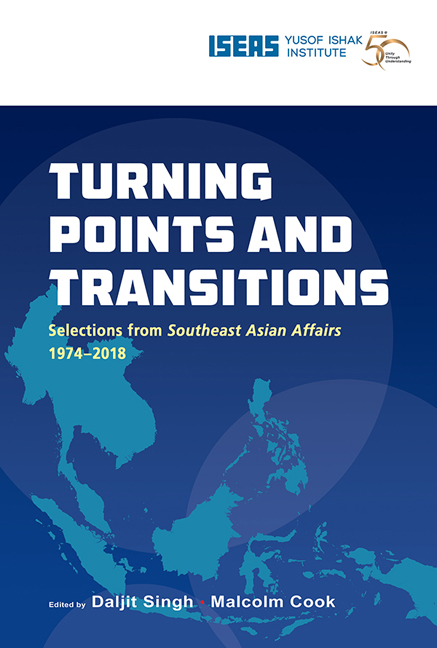Book contents
- Frontmatter
- Contents
- Message from the Director
- Foreword
- Foreword
- Introduction
- THE REGION
- BRUNEI
- CAMBODIA
- INDONESIA
- LAOS
- MALAYSIA
- The Security “Gap” in Peninsula Malaysia (1976)
- The ‘Battle Royal’ – The UMNO Elections of 1987 (1988)
- Malaysia: A Fateful September (1999)
- Tears and Fears: Tun Mahathir's Last Hurrah (2004)
- Malaysia: Political Transformation and Intrigue in an Election Year (2009)
- MYANMAR
- THE PHILIPPINES
- SINGAPORE
- THAILAND
- VIETNAM
Tears and Fears: Tun Mahathir's Last Hurrah (2004)
from MALAYSIA
Published online by Cambridge University Press: 29 May 2019
- Frontmatter
- Contents
- Message from the Director
- Foreword
- Foreword
- Introduction
- THE REGION
- BRUNEI
- CAMBODIA
- INDONESIA
- LAOS
- MALAYSIA
- The Security “Gap” in Peninsula Malaysia (1976)
- The ‘Battle Royal’ – The UMNO Elections of 1987 (1988)
- Malaysia: A Fateful September (1999)
- Tears and Fears: Tun Mahathir's Last Hurrah (2004)
- Malaysia: Political Transformation and Intrigue in an Election Year (2009)
- MYANMAR
- THE PHILIPPINES
- SINGAPORE
- THAILAND
- VIETNAM
Summary
Amidst tears and apprehension about a future without a man who became synonymous with Malaysia for over a generation, Malaysia's fourth and longestserving prime minister stepped down after a sixteen-month transition on 31 October 2003, making way for the tenure of his appointed deputy, Abdullah Ahmad Badawi. Malaysia's new prime minister faces an extraordinary set of challenges, many of which were the direct result of his predecessor's twenty-two-year premiership that ended on a high note of international stature and strong domestic support, especially among non-Malays. Mahathir's last year in office was indeed a tribute to his service to Malaysia, yet it was riddled with controversy at home and abroad as his style of rule and views provoked strong criticism. Abdullah's first few months in office sent a signal that his leadership differed both in style and substance. However, he needs to obtain a strong political mandate in the general election and party elections in 2004, before he can effectively implement reforms and initiate policies that address some of the problems Tun Mahathir left behind.
Grand and Controversial International Exit
Over the course of his twenty-two years in office, Mahathir propelled Malaysia on to the international stage, citing its success in managing ethnic tensions, promoting economic development and projecting an anti-Western stance as a calling card for the developing world and Muslim nations. While the merits of Mahathir's record in these areas remain contentious, 2003 was used to solidify his role as an international spokesman on issues of co-operation and social justice in the international community. The year saw the culmination of a gradual progression of a foreign policy over the last third of his years in office involving extensive overseas travel and the systematic expansion of his exposure in Africa, the Middle East, and Latin America. At its core Mahathir projected himself as one of the leading critics of the United States, whose policy in Iraq isolated itself from the international community.
The grand exit unfolded in three acts, involving three different gatherings that drew international attention. In February, Malaysia hosted the Non-Aligned Movement (NAM) conference in Kuala Lumpur. The event served to galvanize opposition to perceived unilateralism on the part of the Bush administration.
- Type
- Chapter
- Information
- Turning Points and TransitionsSelections from Southeast Asian Affairs 1974-2018, pp. 444 - 459Publisher: ISEAS–Yusof Ishak InstitutePrint publication year: 2018

